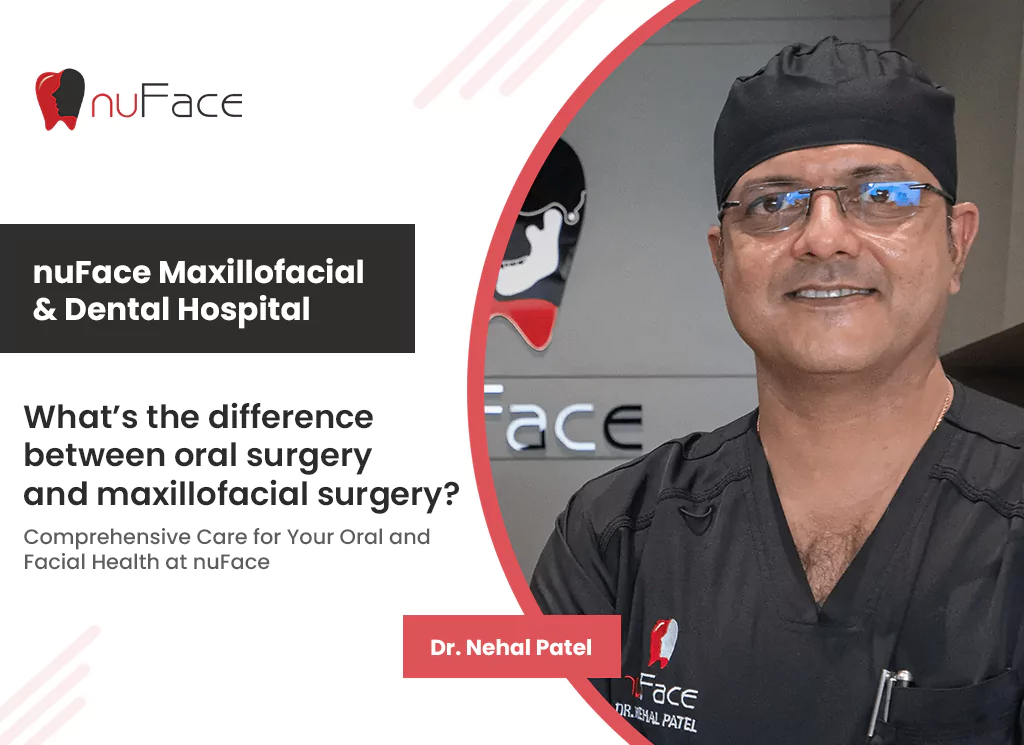Comprehensive Care for Your Oral and Facial Health at nuFace
When it comes to dental and facial health, terms like oral surgery and maxillofacial surgery often arise.
Although these specialties are related, they are distinct in many ways, offering different levels of care for patients facing a variety of dental and facial conditions.
At nuFace Maxillofacial & Dental Hospital, led by Dr. Nehal Patel, we specialize in both fields, providing comprehensive care for patients in India and globally.
But what exactly sets these two surgical specialties apart? This blog will clarify the differences and explore why choosing the right specialist is crucial for your health.
Understanding Oral Surgery
Oral surgery focuses primarily on procedures within the mouth, particularly on the teeth, gums, and related structures. Oral surgeons are trained to perform a variety of dental procedures, often involving:
- Tooth Extractions: Removing impacted, decayed, or problematic teeth, including wisdom teeth.
- Dental Implants: Placing artificial tooth roots to support crowns or bridges.
- Biopsies and Oral Cancer Treatment: Diagnosing and treating suspicious growths or lesions in the mouth.
- Periodontal Surgery: Treating severe gum disease that cannot be managed with non-surgical methods.
Oral surgery is typically recommended when a general dentist identifies a condition that requires more specialized care.
Many oral surgeons also collaborate with orthodontists and prosthodontists to provide corrective jaw surgery and pre-prosthetic surgery.
What is Maxillofacial Surgery?
Maxillofacial surgery, on the other hand, extends beyond the oral cavity to address complex conditions affecting the face, jaw, and neck.
Maxillofacial surgeons undergo extensive training to manage trauma, diseases, and deformities in these areas. Their scope of expertise includes:
- Trauma Surgery: Treating facial fractures, such as broken jaws, cheekbones, or eye sockets, often resulting from accidents or sports injuries.
- TMJ Disorders: Diagnosing and treating disorders of the temporomandibular joint (TMJ), which can cause chronic pain, jaw stiffness, and misalignment.
- Orthognathic Surgery: Correcting jaw misalignments to improve chewing, speech, and facial symmetry.
- Cleft Lip and Palate Surgery: Repairing congenital facial deformities that affect a patient’s ability to eat, speak, or breathe properly.
- Oncologic Surgery: Removing tumors or growths from the face, jaw, or neck, including reconstruction after cancer treatments.
As Dr. Nehal Patel explains, “Maxillofacial surgery covers a wider scope than oral surgery. It involves not just dental care but also treating conditions affecting the entire face and jaw, which may require more comprehensive and intricate surgical interventions.”
Training and Expertise: What Sets Them Apart?
The key difference between an oral surgeon and a maxillofacial surgeon lies in the breadth of their training.
Oral surgeons are dentists who have pursued additional surgical training, generally for 4 to 6 years.
Maxillofacial surgeons, however, undergo even more extensive training, often incorporating both dental and medical education.
Maxillofacial surgeons are equipped to handle more complex cases, involving not just teeth and gums, but the entire facial structure.
Dr. Nehal Patel, a leading maxillofacial surgeon, has performed thousands of surgeries, treating sports injuries, facial trauma, and TMJ disorders using cutting-edge techniques like minimally invasive arthroscopy.
“Maxillofacial surgery is a specialized field that requires precision and a deep understanding of the facial anatomy.
Whether it’s reconstructive surgery after trauma or correcting a jaw misalignment, the goal is always to improve both function and aesthetics,” says Dr. Nehal Patel.
Conditions Treated by Oral Surgeons vs. Maxillofacial Surgeons
Common Conditions Treated by Oral Surgeons:
- Impacted teeth removal (wisdom teeth)
- Dental implant placement
- Oral cysts and tumor removals
- Gum graft surgery
- Sleep apnea-related surgeries
Common Conditions Treated by Maxillofacial Surgeons:
- Facial fractures (jaw, cheekbones, and nasal fractures)
- TMJ disorders and surgeries
- Complex tooth extractions with facial trauma
- Orthognathic surgery for bite correction
- Facial reconstruction after cancer surgery
- Treatment of congenital defects (cleft lip and palate)
Overlapping Areas
While the two specialties differ, they often overlap.
For example, complex tooth extractions, such as removing deeply impacted wisdom teeth, may be handled by either an oral surgeon or a maxillofacial surgeon.
Similarly, both specialists may place dental implants or address facial pain, though maxillofacial surgeons are typically called upon for more complicated cases involving structural facial issues.
At nuFace Maxillofacial & Dental Hospital, we ensure that every patient receives the most appropriate care for their specific condition.
Our team collaborates across disciplines to offer both oral and maxillofacial surgeries, depending on the complexity and severity of the problem.
Why Choose nuFace for Oral and Maxillofacial Care?
When it comes to choosing between an oral surgeon and a maxillofacial surgeon, the right specialist depends on your condition.
At nuFace, Dr. Nehal Patel and his team offer a blend of expertise in both fields, ensuring that you receive the highest quality care whether you need a simple tooth extraction or a complex facial reconstruction.
Our state-of-the-art technology, including 3D imaging and advanced diagnostic tools, allows us to deliver precise and effective treatments.
With a holistic approach to patient care, we also provide comprehensive rehabilitation and psychological support for those recovering from surgery.
Connect with us on Facebook, Instagram, and YouTube to learn more about our services, success stories, and expert advice on oral and maxillofacial health.
Understanding the difference between oral surgery and maxillofacial surgery is essential for making informed decisions about your healthcare.
While both fields focus on improving dental and facial health, maxillofacial surgeons offer a broader range of services, addressing more complex facial issues.
Whether you’re dealing with a tooth extraction, TMJ disorder, or facial trauma, nuFace Maxillofacial & Dental Hospital is equipped to provide the expert care you need.
To schedule a consultation or learn more about our services, visit nuFace Hospital.






